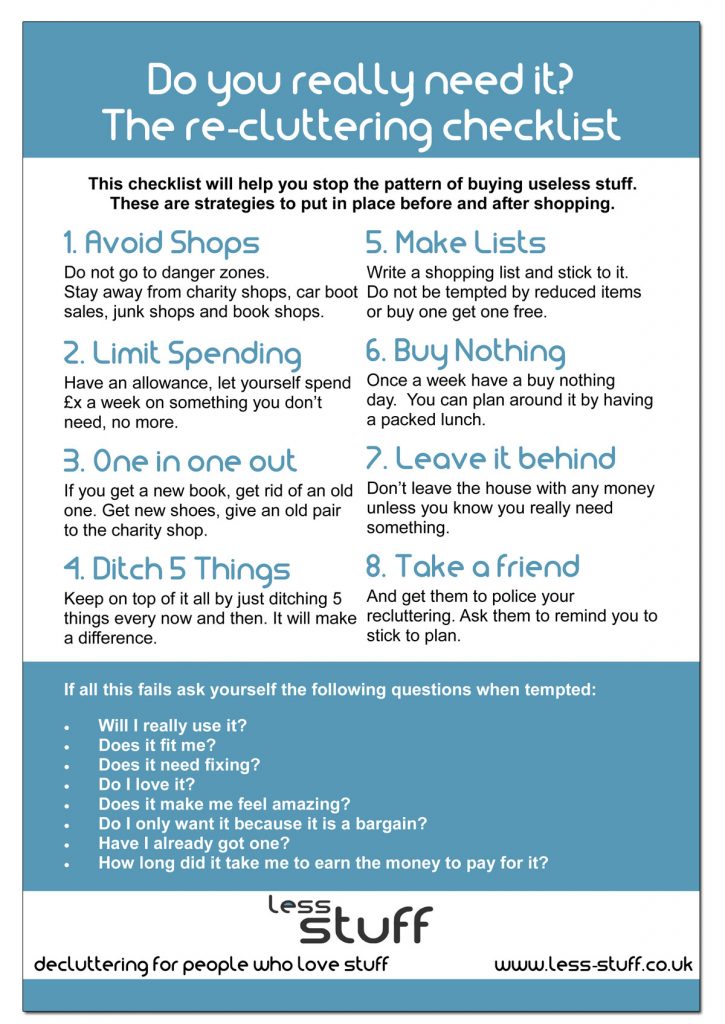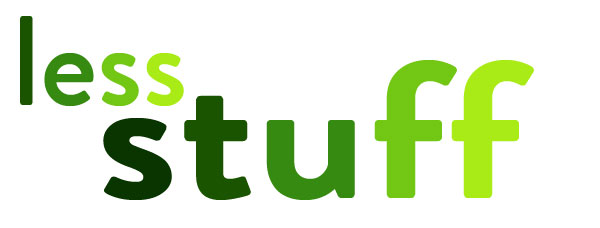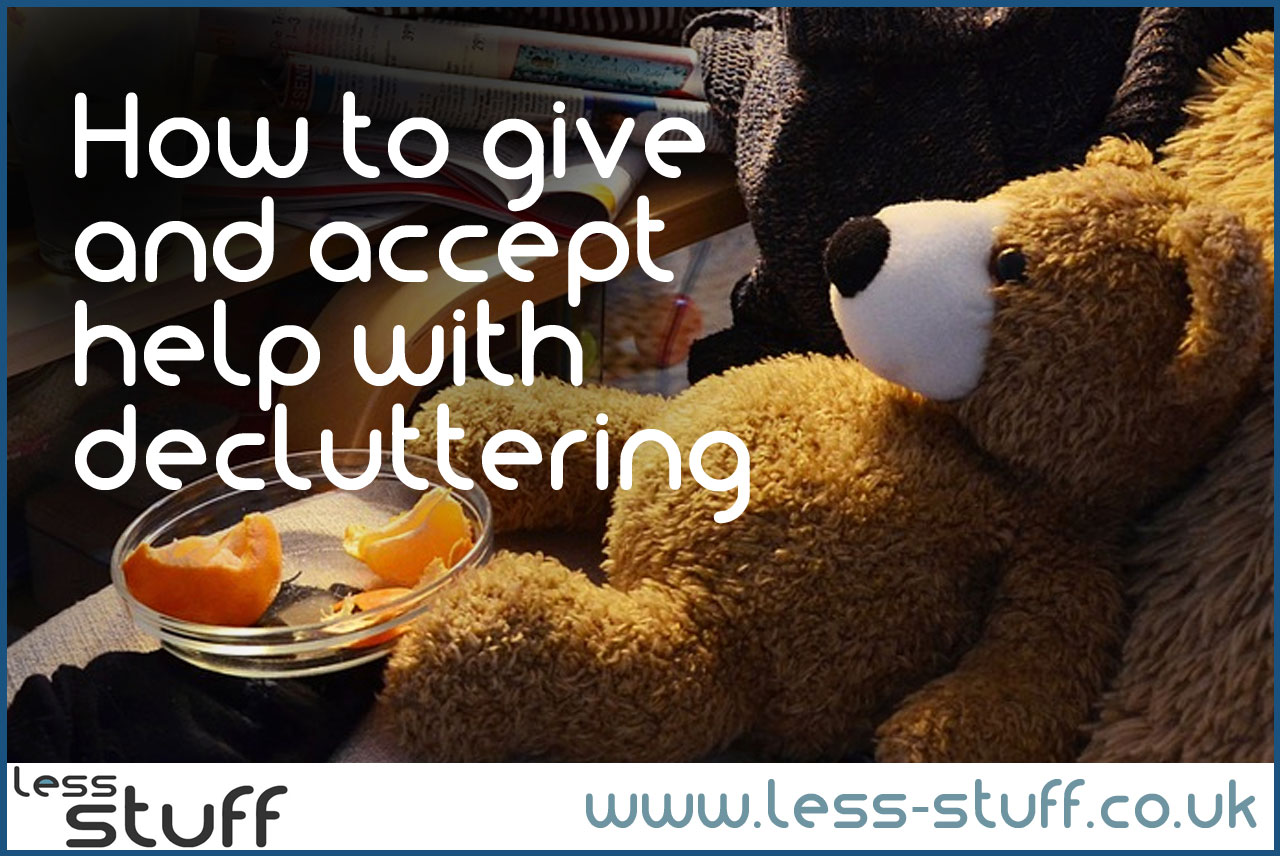
How to give and accept help decluttering
In a nutshell – the less-stuff Facebook group got together to make a list of ideas to consider when either helping someone declutter, or accepting help from someone else.

There are some times where we really cannot do it all and we need help from friends. When our friends are in similar situations we can offer our help. Clutter is very personal stuff so in order to stay friends it helps to have some guidelines and boundaries.
There is a difference between major hoarding and clutter. Helping someone whose hoarding is a symptom of mental illness can be a specialist task because of the complexity of feelings and possible paranoia involved. www.helpforhoarders.co.uk is a support website for hoarders and their families, it has lots of resources and ideas for helping people who have hoarding disorder. This post is ideas for help with clutter, not hoarding.
This ideas for this post came from the less-stuff Facebook group, I have just compiled them and added words when things need clarification. Huge thanks to Angela, Anita, Clare, Dawn, Elaine, Elspeth, Jane, Jenny, Joanna, Linda, Sophia and Toets for your wonderful words of wisdom.
What can go wrong?
The definition of clutter is different for everyone so it can be very tricky to get someone else involved in the process. A few people had personal experiences of it not going to plan….
“I tried to help my brother a few years ago, with the idea that he would help me in return. But no…..he wanted to keep everything. I couldn’t actually work out WHAT he was prepared to part with. We just about managed to clear his bed so he could actually sleep in it. I decided not to ask him for reciprocal help because I could see him hoarding my cast offs as well. “
I’m hoping that this list of ideas will provide some help and ideas to make it possible to give and accept help without it going wrong.
The worst case scenario
If you are offering decluttering help it may be useful to think about what you wouldn’t like yourself.
- “I wouldn’t like someone judging me or my stuff.”
- “I don’t want anyone to tell me how to do it.”
- “I don’t want anyone to take over.”
- “I don’t want someone to make choices for me.”
- “I wouldn’t like it if someone helped me decide what to keep, that is personal.”
- “I wouldn’t like it if anyone decluttered something of mine without asking.”
- “I don’t want to have to defend my decisions.”
- “I wouldn’t want someone who was hovering over me trying to claim my throwaways for themselves! I’d be happy for them to take a box away and have anything they could make use of but not acting like they were at a car boot sale and grabbing at my stuff – I’d get all protective about it again!”
Close family might not be the best choice for helper. The normal restrictions of polite reserve can go out of the window with family members.
“I don’t feel I can trust anyone in my immediate circle to offer any kind of appropriate support, my family often talk about chucking all my ‘crap’ out! It hurts.”
And if you are decluttering clothes, find a helper who is not the same size as you, so they won’t be tempted by your cast offs. Linda put it perfecty:
“Choose your helper carefully. Someone who loves they same sort of stuff as you do might not be the best choice. For example don’t let another knitter declutter your yarn stash or a vintage fashion collector help you with your wardrobe. Set out some clear guidelines explaining the process and that the things you don’t want are to go to either rubbish or charity. If they do want something at the end of the process you would expect them to make a donation to your chosen charity.”
With this in mind, here are some more positive ideas to make it work for both parties.
Clarify expectations and set a time limit
I’m a big fan of decluttering in very small doses but sometimes you need to get rid of more stuff. If you are getting help with this, agreeing on some rules and clarifying your expectations before you start will save a lot of heartache.
- Set a time limit: “Know when to stop so we can leave the space tidy and make sure the place looks okay when we stop (not more messy than before).”
- Define an area to declutter
- Clarify what help you need or will give
- Decide how you want to leave it at the end: “Build in enough time at the end to clean all your tools and put it all away again.. so if you stop the working day at 5pm the cleaning and clearing starts at quarter past four.”
Tips for accepting help with decluttering:
- Set a time limit and make time for clearing up after
- Give clear tasks; sort the recycling, take clutter to the charity shop etc.
- Set clear boundaries, you won’t want someone to help you make decisions.
- Take time, this is not a job to be hurried.
Tips for giving help with decluttering
- Remember it is not your stuff so you cannot decide if anyone else wants or needs to keep it.
- Only offer if you can genuinely help with practical or moral support.
- Offer physical help with cleaning, sorting or transport.
- Help pack things away and clear up after.
- Make tea often and remind people to take breaks.
- Don’t treat it as a free shop for yourself.
- Don’t judge other people’s clutter.
- Don’t rush people into decision making.
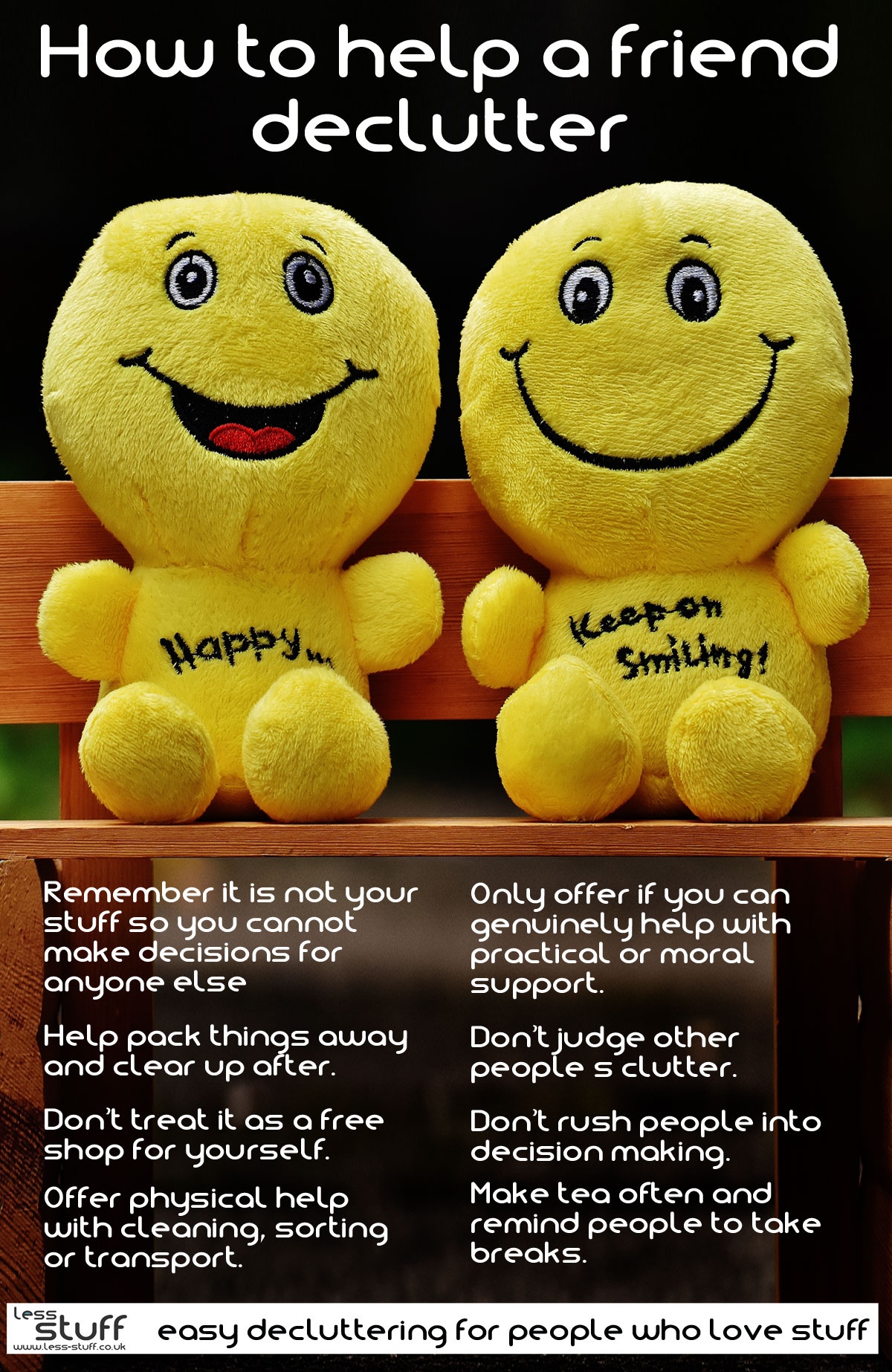
Ideas for practical help
Generally, it is not a good idea to make decisions about someone elses stuff. There are lots of practical things you can do instead that don’t involve sharing the decision making process.
Transport
“I have a neighbour who works in local charity shop and she will take small amounts away for me.. So sometimes I have a “full a bag for W by Monday lunchtime” challenge with myself!”
- Offering lifts to the recycling centre when it’s mutually convenient.
- Taking away the things you need taking away and deciding where they go from there! “I get overwhelmed by guilt of contributing to landfill and never sure if things are worth going to charity etc…”
Childcare
It is difficult decluttering with children around. They can suddenly decide that something that didn’t belong to them, that was broken and previously ignored is the most important thing in their lives and you should keep it. Childcare is one of the best things you can do to help someone who is trying to declutter.
“Another practical help would actually be someone to take my children every now and again .. I seldom with get time to get very far.. So whilst I can manage little bits of decluttering, anything major, or any reorganisation is pretty impossible with two small boys around.. Even getting things as far as the loft is hard!!!”
“It would be helpful if I had some help with childcare. Even the simplest de-cluttering task seems impossible and ends up taking so long and being so stressful.”
“Childcare would help because the “help” of children is disastrous!”
“We’re lucky enough to have a great 2nd hand shop in the village but you can’t park outside it so my children have to come in with me which means a battle to stop them wanting to buy more clutter!”
Hands on help
There are lots of practical things a helper can do to free up the declutterer to get on with sorting their stuff out. If you feel you can’t get a helper involved with the actual decluttering, having help with something else can really make a difference.
“When I helped a friend do a major declutter 2 years ago I took away all the boxes as she filled them. Then I decided whether the stuff was rubbish, to be handed on to someone who needed it or 2nd hand and disposed of it appropriately. It’s far less stressful doing the end process when you’re not emotionally involved with any of the items!”
- Providing boxes or bags to declutter into.
- Help with cleaning; “I feel cluttered when there’s lots of dust gathered, so help with cleaning makes a difference.”
- Help with piling like with like and putting in alphabetical or date order for instance.
- “Having a helper does mean one concentrates on just that place – so emptying a cupboard, cleaning it and the contents and putting them back or discarding them can be good.”
- “A big practical help would be if someone were able to help declutter devices for me!!! The backlog of (mostly pics) stuff on phone and computer etc means everything has ground to a bit of a halt.. I go through and delete sometimes, but could do with someone who knows what they’re doing to go through with me and also tell me about iClouds and that kind of thing.”
- DIY; helping with things that are doable like: declutter that corner with garden stuff and then paint that wall together. Hang that lamp. Move that cupboard.
- Making tea and coffee and reminding the declutterer to have regular breaks.
- “What WOULD be lovely would be if someone would tackle a more mundane job like the cleaning or gardening or cooking or the dishes to give me time and space to get my head around a decluttering task without housework to divert my attentions.”
- “It would help me if they agree to do some little project in the same room that is important for me. Like.. alphabetising the records or extra cleaning all the cutlery. While letting me go on with the organising bit.”
Moral support
Good support doesn’t have to be in person. If you can provide a listening ear on the end of a phone line you can still do a lot to help. Moral support is just about letting people know it is ok.
“When my partner was decluttering his things, after 20+ years in one house I found he needed more moral support than practical. He also needed permission that I was OK with his keeping stuff that was meaningful to him. He was all set to get rid of a much loved Corgi toy car collection when I saw his expression of joy as he explained what each one was. I suggested we keep them and clear a cabinet and display them where they could be properly appreciated. He was so relieved! I really like them too!
- “Just setting a time with a (close, understanding and generous) friend to come round to support me would mean I’d definitely make time for it (and stick to it) and then the friend would help me make more objective decisions about what to throw/give to second-hand shop. I would find this especially helpful with clothes! If I did it with a friend it would be fun!”
- “Even if they were reading their own book, or doing their own little brought project they didn’t do themselves at home, just having someone around would help.”
- “Help holding space, making sure people are safe and heard. Sometimes sharing the story of an item with a friend can give you the space to release it.”
- “Just being in the same room, doing something else, but watching my back and help me to stop before I drown.”
- “Sometimes drinking tea, listening and witnessing the detangling of emotional obstacles to letting go of the things is enough.”
- “It would help to have someone remind me to take breaks and to make tea.”
- “It would help to have someone remind me to slow down so I didn’t make mistakes.”
- “Some times a friend and I will msg each other a pic of area to be decluttered, and then say.. See what you can do in 10/20/30 mins depending.. And then update the other.. It’s actually quite fun!”
Be non judgemental
We all have stuff we don’t feel great about and decluttering is not the time to comment on someones sequin platform boots or their collection of toilet rolls.
- Understanding. Non-judgement. “Just be there and love me whatever happens, but especially when I’m struggling.”
- “My clutter, my rules of engagement. Suggestions are welcome, but don’t get pissed off if I chose not to follow them.with my and forcing me to defend my things and space.”
- “I obviously don’t want to feel judged, and I don’t want my husband to be judged (he is a hoarder) and I don’t want my chaos to be judged!”
- “No judging. Not about the stuff that’s there, not about how difficult I find it to make decisions, not about not having a system, not about wanting to keep things another person wouldn’t, not about the dust that has gathered, not about getting tired or emotional during the process… Not about anything!”
Plan rewards
Decluttering is a big deal, it takes physical and emotional energy. Plan to treat yourself at the end of a decluttering session no matter what role you take in it. You could say thank you to your helper by taking them out for a drink, or taking time to spend with them doing something nice. Try not to reward yourself with more stuff!
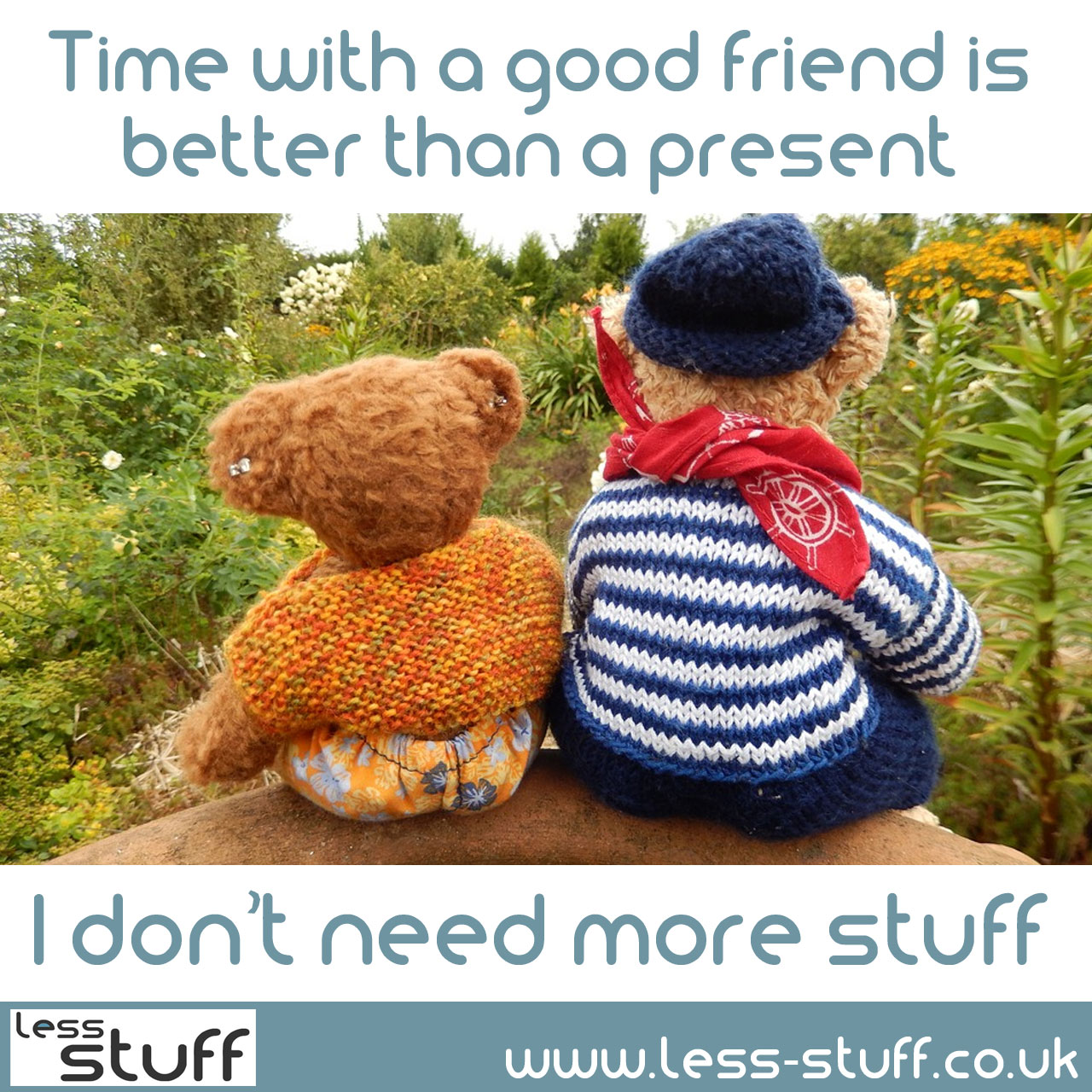
The alternative to big decluttering sessions
If you nibble away at your clutter on a daily basis you will be really surprised by the amount of stuff you can get rid of painlessly. It’s a good idea to limit the amount of things coming into the house and train your friends and family to stop giving you cluttery presents too.
If you do need to declutter in a big swoop just remember to take your time and be kind to yourself, and your helper.
